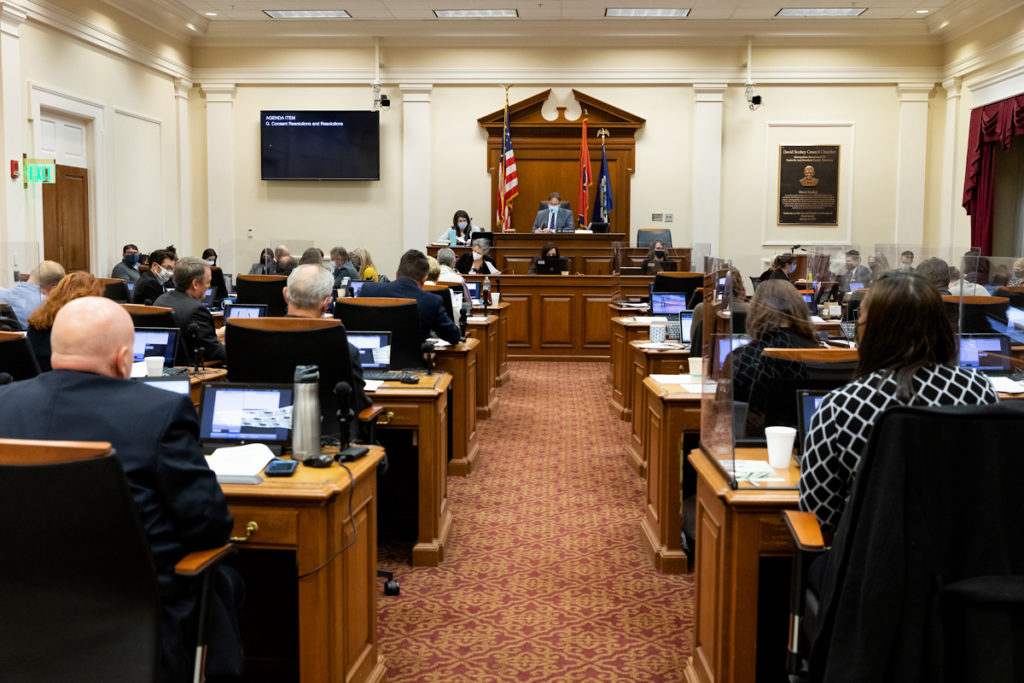
Nashville’s Metro Council does not have to approve redistricting maps right now.
The court has issued a temporary injunction against a new Tennessee law that cuts the 40-person council in half. Plaintiffs argued that the law’s proximity to the August election would make it difficult to redistrict, and a three-judge panel agreed, writing that the law could confuse voters and “compromise” the election’s integrity.
At a press conference Tuesday, Metro Law officials explained that the panel decision was partially born out of the rushed timeline.
“You can’t shift the rules that close to an election. People need more certainty,” Associate Director Allison Bussel said. “People need to know what district they’re voting in, and people need to know if their voter registration card is reading correctly.”
The judges also found that the law was in violation of the Home Rule Amendment, which says that the legislature cannot pass private acts that apply to a city; rather, it’s the city’s responsibility to alter its charter by referendum.
The city argued that the state was guilty of “egregious overreach.”
 Cynthia Abrams WPLN News
Cynthia Abrams WPLN NewsMetro Law Director Wally Dietz (center) speaks at Tuesday’s press conference following the three-judge panel’s decision to issue a temporary injunction against the new state law.
“What is clear is that in January, legislators launched an assault on Nashville with bills that affect the council, the authorities, our ability to do several things,” Metro Law Director Wally Dietz said. “Where it appeared that Metro was the only target of that legislation, we have now succeeded in blocking, at least this year, the implementation of one of those bills.”
While the litigation is not yet complete, Metro feels without the urgency factor, it likely can proceed through its ordinary course.
So long as the Supreme Court does not vacate the injunction — which Metro attorneys think is unlikely given the judges’ recent ruling — the August election will take place as originally scheduled — 40 members and all.
This is what most of the council hoped for. District 18 Councilmember Tom Cash, who was present at Tuesday’s briefing, explained:
“40 members over 20 members gets us closer to, you know, a direct democracy, which can be messy but has some advantages in connecting with people and doing what they want.”
This was one of the two lawsuits that were filed following the new law’s passage.
Another was filed by some Metro councilmembers and Davison County constituents. The plaintiffs in that suit include Zulfat Suara, Delishia Porterfield and Sandra Sepulveda — all Metro councilmembers currently seeking reelection — as well as Quin Segall, a candidate for Metro Council; David Tucker and Judy Cummings, Nashville religious leaders; Dave Goetz, a former leader of the Tennessee Department of Finance and the Tennessee Chamber of Commerce; and Alma Sanford, a community member. Like the city’s suit, they alleged that the law is in violation of the state constitution and that the rushed timeline is impossible to comply with.
The law was one of a number of bills passed this legislative session creating tension between state and local governments. Many believe that the measures are a form of political retaliation, after the city rejected a proposal to host the 2024 Republican National Convention.
After the law passed, Metro was given just 30 days to come up with new district lines, with a deadline of Monday, April 10. The last time Metro was redistricted — back in 2021 after the decennial census — it took the planning department nearly six months to complete the process. The expedited time frame created concerns, as department officials prepared for intense debate over where the lines should fall.
Monday’s ruling came an hour before the Metro Council met to discuss another high-profile decision — whether to reappoint freshman Democrat Justin Jones back to the District 52 seat in the Tennessee House, after the GOP-led legislature voted to expel Jones and another young Black lawmaker over their gun reform protest on the chamber floor. The council voted unanimously in favor of reseating Jones.
This is a developing story. This post was last updated at 4:25 p.m. on Tuesday, April 11.

